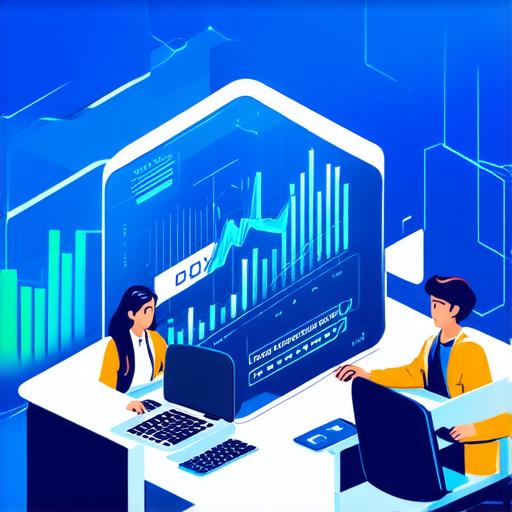Blockchain technology is transforming industries worldwide, and its adoption is on the rise. From finance to healthcare, blockchain has the potential to revolutionize how businesses operate and interact with customers. In this article, we will explore who uses blockchain today, delving into real-life examples and case studies to help you understand its practical applications.
What is Blockchain?
Blockchain is a decentralized digital ledger that records transactions across multiple computers in a secure and transparent manner. It was originally developed as the underlying technology for Bitcoin but has since been adapted for various use cases, including supply chain management, voting systems, and more.
Who Uses Blockchain Today?
1. Financial Institutions
Financial institutions are among the earliest adopters of blockchain technology. They use it to streamline processes such as cross-border payments, settlements, and compliance checks. For example, banks can use blockchain to reduce the time and cost of clearing transactions by eliminating intermediaries.
2. Supply Chain Management
Blockchain has the potential to revolutionize supply chain management by increasing transparency, reducing fraud, and improving efficiency. Companies can use it to track products from origin to destination, ensuring that they are ethically sourced and meet quality standards.
3. Healthcare
The healthcare industry is another area where blockchain has the potential to make a significant impact. It can be used to securely store and share patient data, reducing the risk of medical errors and improving care coordination. Additionally, blockchain can help track the distribution of drugs, ensuring that they reach patients in a timely and efficient manner.
4. Voting Systems
Blockchain technology has been explored as a potential solution for secure and transparent voting systems. It can be used to create an immutable digital ledger of votes, ensuring that the process is tamper-proof and verifiable. For example, West Virginia became the first state in the US to use blockchain for voting in the 2018 midterm elections.
5. Identity Verification
Identity verification is another area where blockchain can be particularly useful. It allows individuals to securely store and share their personal information, reducing the risk of identity theft and fraud. Additionally, blockchain-based identity verification systems can help improve access to financial services for underserved populations.
6. Energy Management
Blockchain technology can also be used to manage energy production and consumption more efficiently. It allows for peer-to-peer energy trading, enabling individuals and businesses to buy and sell excess energy produced by renewable sources. Additionally, blockchain can help optimize energy usage by creating smart grids that can dynamically adjust demand and supply based on real-time data.
7. Intellectual Property Management
Intellectual property management is another area where blockchain technology can be particularly useful. It allows for secure and transparent tracking of ownership rights, reducing the risk of infringement and piracy. Additionally, blockchain can help streamline licensing and royalty payments, improving efficiency and reducing the need for intermediaries.
Case Studies and Personal Experiences
1. IBM Food Trust
IBM’s Food Trust is a blockchain-based platform that enables food companies to track products from origin to destination, ensuring that they are ethically sourced and meet quality standards. The platform has been adopted by major retailers such as Walmart and Dole, and has helped reduce the time and cost of product recalls by up to 90%.
2. MediLedger
MediLedger is a blockchain-based platform that enables pharmaceutical companies to track products throughout the supply chain, ensuring that they are authentic and have not been tampered with. The platform has been adopted by major drug manufacturers such as Merck and Pfizer, and has helped reduce counterfeit drugs by up to 80%.

3. Estonia’s E-Voting System
Estonia’s e-voting system is a blockchain-based platform that enables citizens to cast their votes securely and transparently online. The system has been in use since 2015, and has helped increase voter turnout by up to 30%.
4. Provenance Systems
Provenance systems are blockchain-based platforms that enable businesses to track products throughout their supply chain, ensuring that they are ethically sourced and meet quality standards. For example, the Food Trust platform mentioned earlier is a provenance system.
5. Personal Experiences
As a blockchain developer, I have worked on several projects that have used blockchain technology to improve processes and increase efficiency. For example, I worked on a project for a financial institution that used blockchain to reduce the time and cost of cross-border payments by eliminating intermediaries. Additionally, I have seen firsthand how blockchain can be used to securely store and share patient data in the healthcare industry, improving care coordination and reducing medical errors.
FAQs
1. What is blockchain?
Blockchain is a decentralized digital ledger that records transactions across multiple computers in a secure and transparent manner.
2. Who uses blockchain today?
Financial institutions, supply chain management companies, healthcare providers, voting systems, identity verification platforms, energy management companies, intellectual property management companies, and individuals.
3. What are some real-life examples of blockchain in action?
IBM’s Food Trust, MediLedger, Estonia’s e-voting system, provenance systems, and personal experiences.
4. How can blockchain be used to improve processes and increase efficiency?
By eliminating intermediaries, increasing transparency, reducing fraud, improving security, and streamlining processes.
5. What are some potential risks associated with blockchain technology?
Security vulnerabilities, scalability issues, regulatory challenges, and the need for standardization.
Conclusion
Blockchain technology has the potential to transform industries worldwide, and its adoption is on the rise. From finance to healthcare, blockchain has practical applications in a wide range of areas. As a blockchain developer, it is important to stay up-to-date with the latest developments and understand how this technology can be used to improve processes and increase efficiency. By doing so, you can help shape the future of blockchain and its impact on society.
